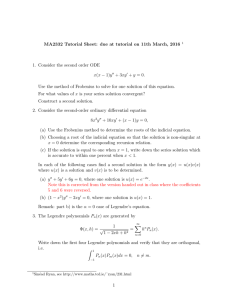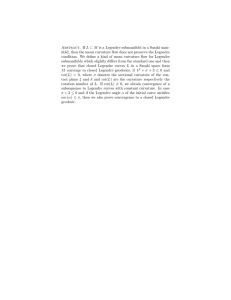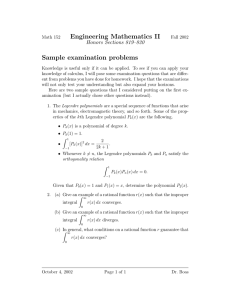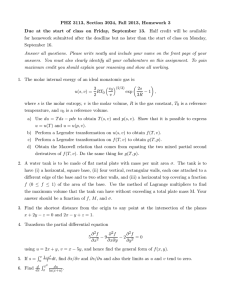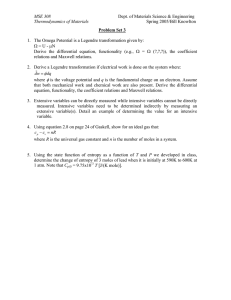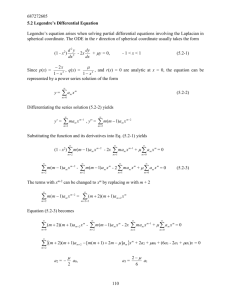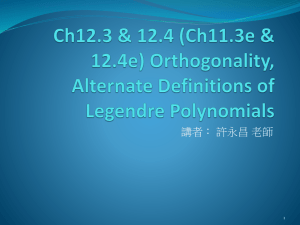Journ@l Electronique d’Histoire des Probabilités et de la Statistique Probability and Statistics
advertisement
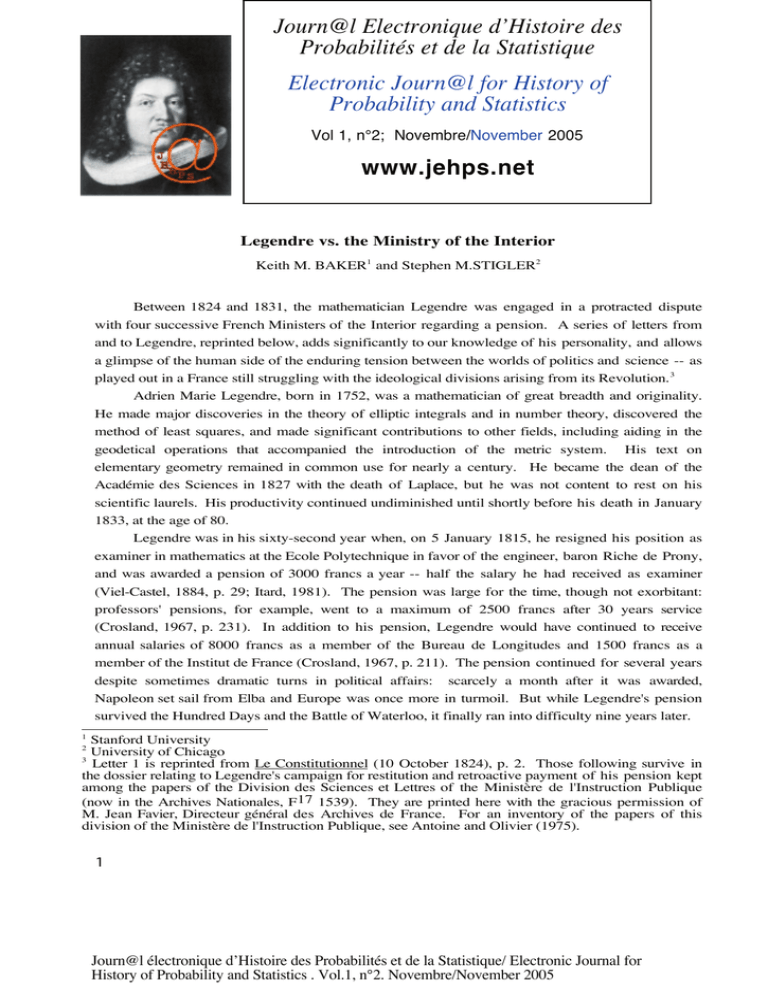
Journ@l Electronique d’Histoire des Probabilités et de la Statistique Electronic Journ@l for History of Probability and Statistics Vol 1, n°2; Novembre/November 2005 ������������� �������� ��� ��� �������� �� ��� �������� Keith M. BAKER1 and Stephen M.STIGLER2 Between 1824 and 1831, the mathematician Legendre was engaged in a protracted dispute with four successive French Ministers of the Interior regarding a pension. A series of letters from and to Legendre, reprinted below, adds significantly to our knowledge of his personality, and allows a glimpse of the human side of the enduring tension between the worlds of politics and science -- as played out in a France still struggling with the ideological divisions arising from its Revolution. 3 Adrien Marie Legendre, born in 1752, was a mathematician of great breadth and originality. He made major discoveries in the theory of elliptic integrals and in number theory, discovered the method of least squares, and made significant contributions to other fields, including aiding in the geodetical operations that accompanied the introduction of the metric system. His text on elementary geometry remained in common use for nearly a century. He became the dean of the Académie des Sciences in 1827 with the death of Laplace, but he was not content to rest on his scientific laurels. His productivity continued undiminished until shortly before his death in January 1833, at the age of 80. Legendre was in his sixty-second year when, on 5 January 1815, he resigned his position as examiner in mathematics at the Ecole Polytechnique in favor of the engineer, baron Riche de Prony, and was awarded a pension of 3000 francs a year -- half the salary he had received as examiner (Viel-Castel, 1884, p. 29; Itard, 1981). The pension was large for the time, though not exorbitant: professors' pensions, for example, went to a maximum of 2500 francs after 30 years service (Crosland, 1967, p. 231). In addition to his pension, Legendre would have continued to receive annual salaries of 8000 francs as a member of the Bureau de Longitudes and 1500 francs as a member of the Institut de France (Crosland, 1967, p. 211). The pension continued for several years despite sometimes dramatic turns in political affairs: scarcely a month after it was awarded, Napoleon set sail from Elba and Europe was once more in turmoil. But while Legendre's pension survived the Hundred Days and the Battle of Waterloo, it finally ran into difficulty nine years later. 1 Stanford University University of Chicago 3 Letter 1 is reprinted from Le Constitutionnel (10 October 1824), p. 2. Those following survive in the dossier relating to Legendre's campaign for restitution and retroactive payment of his pension kept among the papers of the Division des Sciences et Lettres of the Ministère de l'Instruction Publique (now in the Archives Nationales, F 17 1539). They are printed here with the gracious permission of M. Jean Favier, Directeur général des Archives de France. For an inventory of the papers of this division of the Ministère de l'Instruction Publique, see Antoine and Olivier (1975). 2 � Journ@l électronique d’Histoire des Probabilités et de la Statistique/ Electronic Journal for History of Probability and Statistics . Vol.1, n°2. Novembre/November 2005 In January 1824, an election was held at the Académie des Sciences to fill a vacancy in the Section de Mécanique created by the death of Bréguet. The minutes of the academy's meetings record that seven men were nominated to fill the opening: Binet, Navier, Cagniard Latour, Lamandé, Gengembre, Gambey, and Christian (Académie des Sciences, 1918, pp. 6, 9). Evidently there was behind-the-scenes intrigue regarding this coveted position. Legendre's correspondence indicates that the comte de Corbière, then Ministre de l'Intérieur, actively sought the election of the mathematician Jacques-Philippe-Marie Binet, professor of mathematics at the Ecole Polytechnique and (since 1823) professor of astronomy at the Collège de France. The minister's preference for Binet seems clearly to have been a political one. Corbière, one of the principal leaders of the ultraroyalist party, was the inseparable political associate of the comte de Villèle, whose ministry of the Right had ruled France since December 1821. Chateaubriand, with the venomous clarity of an ally turned enemy, later attributed to Corbière an "esprit malfaisant" becoming all the more despotic in the face of political opposition (Chateaubriand, 1951, 2:140). Perhaps more charitably, a modern historian has portrayed him as a man who "concealed under the hide of a Danubian peasant a great deal of finesse and a training in the liberal arts" but was content to run his department "with a happy-go-lucky neglect which put the main work on his bureau chiefs" (Bertier de Sauvigny, 1966, p. 180). In any event, Corbière seems to have been committed to the ultraroyalist program to reduce the secular power of the Napoleonic University over public instruction and to recover control over French intellectual institutions for the monarchical Catholic right. In 1820, swept briefly (with Villèle) into the more moderate government of the duc de Richelieu by the conservative backlash following the assassination of the duc de Berry, he had assumed ministerial responsibility for public instruction, quickly seizing the occasion to give bishops authority of surveillance over all the educational establishments in their dioceses and to allow for the upgrading of Catholic secondary schools to the same official status as secular schools (Bertier de Sauvigny, 1966, pp. 173-4; Cabanis,1972, p. 348). With Villèle and the duc d'Artois (the reactionary future king Charles X), Corbière was one of the chief architects of the ultraroyalist government that came to power under Villèle's leadership at the end of 1821; and the three were already remodelling that government, in anticipation of the new reign, during the weeks of Louis XVIII's last illness in August and September 1824 (Cabanis,1972, p. 257; Bertier de Sauvigny, 1966, pp. 177-81, 367). One of the changes during this period was the elevation of the bishop of Hermopolis, Frayssinous, already appointed Grand Master of the University in 1821, to ministerial rank with the combined portfolio of ecclesiastical affairs and public instruction. Corbière's Ministry of the Interior was evidently not inclined to separate judgments regarding the advancement of knowledge from religious considerations. In this context, there was a clear political logic to the ministerial preference for the notably Catholic Binet to succeed Bréguet at the Académie des Sciences -- a preference communicated to the academicians by what Legendre described (Letter 4) as a "circulaire menaçante" signed by Jacques� Journ@l électronique d’Histoire des Probabilités et de la Statistique/ Electronic Journal for History of Probability and Statistics . Vol.1, n°2. Novembre/November 2005 Honoré Lourdoueix, chief of the Division of Sciences and Letters of the Ministry of Public Instruction. The government had apparently already imposed Binet's appointment to the chair of astronomy at the Collège de France (succeeding Delambre) in 1823, against the wishes of the academicians and his future colleagues.4 Not surprisingly, Legendre's characterization of him as a man hiding inordinate ambition under a "masque de dévotion" (letter 9) is a distinctly acid one. In the case of the election to succeed Bréguet at the Académie des Sciences, the preferred choice of Legendre and the other members was Navier. Of the 56 votes cast on 26 January 1824, the minutes indicate that three were blank and that Navier received at least the 30 required for election (Académie des Sciences, 1918, p. 10). Legendre tells us Binet received 11 votes and Navier 46; while there is a slight discrepancy in these figures, it is clear that Navier's margin of victory was a commanding one. Binet (who lost his appointment at the Ecole Polytechnique with the July Revolution of 1830) was not to be elected to the Académie until 1843. Corbière did not take the defeat graciously. He delayed confirmation of the election until 14 June 1824, and, while he may have borne no ill will towards Navier (who was decorated with membership in the Legion d'Honneur on 26 July 1824, presumably with Corbière's approval), Legendre's role in the defeat seems to have rankled him. That Legendre could be annoying comes through clearly in these letters, and his personality may have contributed to the fact that in September 1824, while Louis XVIII lay dying, Corbière settled accounts by obtaining the king's signature on a document that summarily cut off Legendre's pension. As Legendre states in this correspondence, the case received attention in the press at the time. On 10 October 1824, the principal liberal newspaper of the period, Le Constitutionnel, printed a strongly worded letter from Legendre that had apparently been published elsewhere as well, and the case received passing mention in Le Constitutionnel for several weeks thereafter. Despite these protests (or perhaps because of them), Corbière's decision stood until January 1828, when the Villèle government finally fell. One of the first acts of the new Minister of the Interior, the vicomte de Martignac, was to restore Legendre's pension -- though whether this was the result of a direct or indirect plea from the mathematician or of the minister's own initiative, as Legendre diplomatically states in his letter to Martignac on 14 January, remains unclear. According to Lacaine and Laurent (1847), Ch. Dupin aided in the restoration, although they give no details. The remainder of the story comes through vividly in these letters. Legendre pleads repeatedly (and unsuccessfully) with Martignac for retroactive payment of the pension for the period between 1824 and 1828, only to have the latter's successor (the comte de Montbel) reduce the pension to 2000 francs in January 1830. He takes advantage of the July Revolution of 1830 to press the new Minister of the Interior (the historian François Guizot) to restore the full pension, and then tries 4 In Letter 9, Legendre refers to Binet's appointment to the chair of astronomy at the Collège de France as occurring after the ministry's unsuccessful effort to impose him on the Académie des Sciences. Legendre's memory appears to have misled him on this point. Binet was appointed to the Collège de France in 1823 (Grattan-Guinness, 1990, pp. 193, 915). � Journ@l électronique d’Histoire des Probabilités et de la Statistique/ Electronic Journal for History of Probability and Statistics . Vol.1, n°2. Novembre/November 2005 (again unsuccessfully) to enlist the support of Guizot's mentor, Pierre Royer-Collard, to convince Guizot's successor, the comte de Montalivet, to restore the arrears he thought due for the periods the pension was cut off or reduced. The story ends with Legendre being awarded the rank of officer of the Legion d'Honneur on 20 January 1831, the same day his request for arrears is refused by Montalivet in no uncertain terms. While the ministry attemped to buy off Legendre with honor, not money, his last letters show he still felt himself the victim of an injustice, though they are resigned where the earlier letters were defiant. He died in 1833, at the age of 80. Taken together, the letters tell a fascinating story, fascinating for what it reveals both about Legendre and about the interactions of science and government at a turbulent time in French history. Legendre was perhaps uncommonly pugnacious and insistent upon what he saw as his rightful property, a trait that he applied in protecting his intellectual as well as his material property. Over the period 1810-1820 he had engaged in a dispute with Gauss regarding the priority of discovery of the method of least squares and the law of quadratic reciprocity in number theory (Stigler, 1977). He was no less forceful in pressing his case for restitution of his pension. Persistence is often a component of success in scientific work, but here we reap an unexpected side benefit in the light the correspondence sheds upon the way the government dealt with scientists. From Corbière's attempts to manipulate an election at the Académie des Sciences, to his retribution upon Legendre, to Legendre's vacillating fortunes with successive ministries, to the final use of promotion within the Légion d'Honneur, we get a vivid picture of a side of a bureaucracy that is seldom captured in the history of science. This investigation was launched in when one of us (S.M.S.) obtained a draft of Legendre’s letter of Jan. 20, 1828, from a French bookseller in 1983. The letter was in Legendre’s hand and perhaps made to circulate, perhaps for his own use. We are grateful for the advice and assistance of Bernard Bru and Ivor Grattan-Guinness in pursuing this investigation. ���������� Acadèmie des Sciences (1918). Procès-verbaux des séances de l'Académie, Tome VIII (18241827). Hendaye: Imprimérie de l'Observatoire d'Abbabia. Antoine, Marie-Elisabeth and Olivier, Suzanne (1975). Inventaire des papiers de la Division des Sciences et Lettres du Ministère de l'Instruction Publique et des services qui en sont issues (sous-série F17), vol. 1. Paris: Archives Nationales. Bertier de Sauvigny, G. de (1966). The Bourbon Restoration, trans. Lynn M. Case. Philadelphia: University of Pennsylvania Press. Cabanis, José (1972). Charles X: roi ultra. Paris: Editions Gallimard. Chateaubriand, François René de (1951). Mémoires d'Outre-Tombe, ed. Maurice Levaillant and Georges Moulinier. 3d ed. 2 vols. Paris: Editions Gallimard. � Journ@l électronique d’Histoire des Probabilités et de la Statistique/ Electronic Journal for History of Probability and Statistics . Vol.1, n°2. Novembre/November 2005 Grattan-Guinness, Ivor (1990). Convolutions in French Mathematics, 1800-1840. Vols. I-III. Basel: Birkhäuser Verlag. Itard, Jean (1981). "Legendre, Adrien-Marie," article in Dictionary of Scientific Biography, ed. C.C. Gillispie, vol. 8, pp. 135-143. New York: Charles Scribner's Sons. Lacaine, Victor and Laurent, C. (eds.) (1847). “Dupin” in Biographies et necrologies des homes marquants du XIX siècle Vol. 4, p. 292. Stigler, Stephen M. (1977). "An Attack on Gauss, Published by Legendre in 1820." Historia Mathematica, 4, 31-35. Viel-Castel, Louis (1884). Histoire de la restauration, vol. 40. Paris: Calmann Lévy. � Journ@l électronique d’Histoire des Probabilités et de la Statistique/ Electronic Journal for History of Probability and Statistics . Vol.1, n°2. Novembre/November 2005
